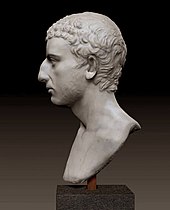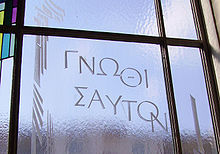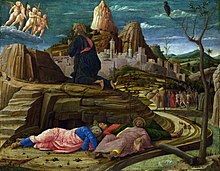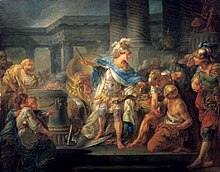List of Greek Phrases / Gamma
Γαλανόλευκη
- Γαλανόλευκη
- Galanolefki
- "The blue and white"
Colloquial term for the flag of Greece , which is officially called Σημαία της Ελλάδος . Another name is Κυανόλευκη Kianolefki , which can also be translated as “the blue and white” (compare cyan ).
The most common interpretation is that the colors blue and white stand for sky and sea foam. Another says that the white represents the purity of the struggle for independence. The cross stands for the Christian tradition. Originally only the version with the cross in the middle was used, later the stripe flag was added as a sea flag . Due to the importance of seafaring for Greece, it also became the state flag.
The colors can be traced back to the Byzantine Empire. They were the colors of the Greek struggle for freedom. The blue varied. During the time of the Wittelsbach King Otto I , a medium blue of Bavarian origin was used. The military junta used a very dark blue. The modern flag law speaks of a light blue.
The nine stripes should represent the nine syllables of the national motto Ελευθερία ή Θάνατος! ("Freedom or Death!").
Γεια σου.
- Γεια σου.
- Yes su.
- "Hello bye!"
Modern Greek greeting, which is derived from υγε iα ijia ('health', compare hygiene ) and σου su ('your'). Γεια σου. means "hello". If you speak to several people (or to someone you see), it is Γεια σας Ja sas . The next thing after the greeting is not how the other person is feeling, but:
- "What's new?" (" Τι κάνεις; Ti kanis? ")
The formula Γεια μας ( μας mas 'our') means Prost and is used when pushed.
Γελῶ δὲ ὁρέων γῆς περιόδους γράψαντας.


- Γελῶ δὲ ὁρέων γῆς περιόδους γράψαντας.
- Gelō de horeōn ges periodous grapsantas.
- "I laugh when I see you drawing your maps of the earth."
With these words, Herodotus is amused in his histories about the world maps of his contemporaries. In the context of describing Persia and Asia, he writes:
"Γελῶ δὲ ὁρέων γῆς περιόδους γράψαντας πολλοὺς ἤδη καὶ οὐδένα νοονεχόντως ἐξηγησάμενον · οἳ Ὠκεανόν τε ῥέοντα γράφουσι πέριξ τὴν γῆν ἐοῦσαν κυκλοτερέα ὡς ἀπὸ τόρνου, καὶ τὴν Ἀσίην τῇ Εὐρώπῃ ποιεύντων ἴσην."
"I laugh when I see them drawing their maps of the earth, many people do, but none of them knows how to explain the matter sensibly: they draw Oceanus as it flows around the earth, which is circular, as if shaped with a compass, and Asia makes them as big as Europe. "
For Herodotus there was no question that Europe was much larger than Asia.
Hekataios of Miletus undertook numerous research trips to Europe, Asia and Egypt. His geographical knowledge allowed him to improve the no longer extant map of Anaximander so much that ancient sources claimed that "it can be called a miracle" . He saw the earth circular with Delphi as the center of the world.
γέλως Μεγαρικός
- γέλως Μεγαρικός
- gelōs Megarikos
- "Megaric laughter"
- Latin " risus Megaricus "
A kind of rough joke that involves sacrificing a friend rather than a joke. The inhabitants of the Attic port city of Megara had a bad reputation among the Athenians.
The classical philologist Ulrich von Wilamowitz-Moellendorff wrote in 1878 in his treatise The Megarian Comedy :
“In other words , a type of comedy which was not unusual on the Attic stage, which Aristophanes himself used (because the entrance of the frogs is a γέλως Μεγαρικός , if one denies, which nevertheless seems unavoidable to me, a reference to Aristophanes' own plays ), he contemptuously calls a Schwank stolen from Megara. Does that admit that the comedy was made in Megara? that is far. The joke is bad for Aristophanes here, which he nevertheless uses where it suits him to make the children laugh, but because it is bad he cannot come from Athens. "
Γενηθήτω φῶς.
- Γενηθήτω φῶς.
- Genēthētō phōs.
- "Let there be light!"
This quote from the Old Testament creation story of Genesis is a literal translation of the Hebrew יְהִי אוֹר. The Latin version is “ Fiat lux ” . It is at the very beginning of the Old Testament and is the central statement on the first day of creation:
1 In the beginning God created the heavens and the earth.
2 And the earth was desolate and empty, and darkness was over the deep; and the Spirit of God hovered over the waters.
3 And God said, Let there be light. and there was light.
4 And God saw the light, that it was good; and God separated light from darkness.
5 And God called the light day, and the darkness he called night. And there was evening and there was morning: the first day.
Under the heading Twice it said: "Let there be light" , astronomers are discussing a double big bang :
“According to the Bible (Book Genesis 1: 3) one word of God was enough to illuminate the world. But more recent astronomical results indicate that he has run out of the 'cosmic sparkle' again and that he had to try a second time. From the light of distant quasars , two astronomers now conclude that the universe did not become permanently transparent to quasar light until at least one billion years after the Big Bang. "
γενιά του '30
- γενιά του '30
- jenia tou '30
- "Generation of '30"
The generation of the 30s is a group of writers who appeared in literature in Greece in the decade between 1930 and 1940, forced a break with the previous generation of poets and established modernism in modern Greek literature.
In 1929 Giorgos Theotokás published an essay entitled Free Spirit ( Ελεύθερο Πνέυμα ), which became the manifesto of the generation of the 30s.
Γένοιο οἷος ἔσσι.
- Γένοιο οἷος ἔσσι.
- Genoio, hoios essi.
- "Become, who you are!"
Warning of the poet Pindar , next to “ Γνῶθι σεαυτόν. ”( “ Know yourself! ” ) One of the famous Delphi inscriptions . The development of the personality is connected with the task of self-knowledge. The addressee of this request was Hieron I , the ruler of Syracuse and winner of the chariot race at the Pythian Games in Delphi.
This sentence is also used by Martin Heidegger in his book Was ist Metaphysik? quoted.
Combining the two sentences it means:
- "Know who you are at the core of your being, then try to become."
The occasion of the choral song was Hieron's victory with the four-team who had founded the city of Aitna ( Αἴτνα ) shortly before (around 475 BC ). He made his son king of the city and promoted poets like Aeschylus , Simonides , Bakchylides and Pindar. Because of this city foundation, he had himself proclaimed as Aitnaier when he won Delphi and Pindar was commissioned to write the song of victory.
Pindar begins with the praise of the Phorminx , whose sound even lulls lightning and eagles. But the monsters who are enemies with the gods put them in fear and terror.
γῆ καὶ ὕδωρ
- γῆ καὶ ὕδωρ
- gē kai hydōr
- "Earth and Water"
The Persians under Darius II demanded earth and water from the Greek states as a sign of their submission and sent heralds across Greece to announce their demands. A large part of the Greeks followed this call to submit, including Aegina , which developed into an internal Greek conflict. The Athenians used this pretext to accuse the Aginetes of Sparta for treason. In the histories of Herodotus it is said:
“Οἵ τε δὴ ἄλλοι νησιῶται διδοῦσι γῆν τε καὶ ὕδωρ Δαρείῳ καὶ δὴ καὶ Αἰγινῆται. ποιήσασι δέ σφι ταῦτα ἰθέως Ἀθηναῖοι ἐπεκέατο, δοκέοντές τε ἐπὶ σφίσι ἐπέχοντας τοὺς Αἰγινήτας δεδωκέναι ὡς ἅμα τῷ Πέρσῃ ἐπὶ σφέας στρατεύωνται, καὶ ἄσμενοι προφάσιος ἐπελάβοντο, φοιτέοντές τε ἐς τὴν Σπάρτην κατηγόρεον τῶν Αἰγινητέων τὰ πεποιήκοιεν προδόντες τὴν Ἑλλάδα. "
“The other islanders now gave Darius earth and water, especially the Aiginetes. But scarcely had they done this when the Athenians were immediately behind them, who thought that the Aiginetes had surrendered themselves to the Persians out of enmity against them, in order to go to war with them. So they gladly seized the pretext and went to Sparta, where they sued the Aiginetes for the treason they committed against Hellas. "
Athens and Sparta were the only ones who resisted the demand for submission, and they even killed the messengers. The Spartans threw the messengers into a well and said to them:
- "Dig yourself!"
After this provocation, Darius prepared for war.
Γηράσκω δ 'αἰεὶ πολλὰ διδασκόμενος.
- Γηράσκω δ 'αἰεὶ πολλὰ διδασκόμενος.
- Gēráskō d 'aieì pollà didaskómenos.
- "I'm getting old and I'm still learning a lot."
Plato makes several references to this Solon quote . It corresponds to the German proverb "You never stop learning" and is in short:
- Γηράσκω ἀεὶ διδασκόμενος.
In his work on old age , Marcus Tullius Cicero writes , quoting these words in the original Greek:
“I did the same; for as an old man I made myself acquainted with Greek literature, and I grasped it so greedily, as if I wanted to quench a protracted thirst, and so I became aware of the very things that you now see as examples. "
He continues on the athlete Milon von Kroton :
“When he was already an old man and saw competitors practicing on the racetrack, he is said to have looked at his arms and said, crying:“ Oh, these have already died! ”No, not these, but rather yourself, babbler. Because you never became famous because of yourself, but because of your chest and your arms. "
Solon divided life into 12 seven-year phases. The heyday begins at the age of 21, at 35 there is the climax of spiritual clarity, at 50 the climax of social recognition. At the age of 63, vital forces begin to decline, but you want to gain experience.
Γίγνωσκε καιρόν.

- Γίγνωσκε καιρόν.
- Gignōske kairon.
- "Know the right time!"
Proclamation of the Pittaco of Mytilene.
The god of the favorable moment, Kairos ( Καιρός ) is shown with a bald back of the head and a mop of hair on the forehead, at which the favorable moment could be grasped, from which the saying goes back to grasping the opportunity . When the opportunity is over, you can no longer grasp the back of the bald head.
Based on this, in psychology the fear of making decisions, the fear of situations in the case of nervous weaknesses, is called cairophobia .
- Latin: “ Tempus nosce ” or “ Nosce tempus ”.
- Modern Greek: Αρπάζω μια ευκαιρία απὸ τα μαλλιά. ( "I'm grabbing an opportunity by the hair." )
- German: "What you turned down at the moment, | It won't bring back eternity. " ( Friedrich Schiller )
Γίνεται δὲ κατὰ τοῦτον τὸν χρόνον Ἰησοῦς ...

- Γίνεται δὲ κατὰ τοῦτον τὸν χρόνον Ἰησοῦς ...
- Ginetai de kata touton ton chronon Iesous ...
- "At this time Jesus was alive ..."
Beginning of the Testimonium Flavianum , the "testimony" (Latin: testimonium ) of the Jewish historian Flavius Josephus about Jesus of Nazareth . It is contained in his Antiquitates Judaicae ( "Jewish antiquities" ) and was published in AD 93. This is the first non-Christian reference that Jesus mentions, and it indicates that Josephus had knowledge of early Christianity . In context it says:
"Γίνεται δὲ κατὰ τοῦτον τὸν χρόνον Ἰησοῦς, σοφὸς ἀνήρ, εἴγε ἄνδρα αὐτὸν λέγειν χρή · ἦν γὰρ παραδόξων ἔργων ποιητής, διδάσκαλος ἀνθρώπων τῶν ἡδονῇ τἀληθῆ δεχομένων, καὶ πολλοὺς μὲν Ἰουδαίους, πολλοὺς δὲ καὶ τοῦ Ἑλληνικοῦ ἐπηγάγετο · ὁ Χριστὸς οὗτος ἦν. καὶ αὐτὸν ἐνδείξει τῶν πρώτων ἀνδρῶν παρ ἡμῖν σταυρῷ ἐπιτετιμηκότος Πιλάτου, οὐκ ἐπαύσαντο οἱ τὸ πρῶτον ἀγαπήσαντες · ἐφάνη γὰρ αὐτοῖς τρίτην ἔχων ἡμέραν πάλιν ζῶν, τῶν θείων προφητῶν ταῦτά τε καὶ ἄλλα μυρία περὶ αὐτοῦ θαυμάσια εἰρηκότων. εἰς ἔτι τε νῦν τῶν Χριστιανῶν ἀπὸ τοῦδε ὠνομασμένον οὐκ ἐπέλιπε τὸ φῦλον. ”
“At this time Jesus lived, a man full of wisdom, if one can call him a man at all. For he did incredible things and was the teacher of those people who liked to receive the truth; so he attracted many Jews and many from paganism. He was the messiah. On indictment from the nobles among us, Pilate condemned him to death on the cross; nevertheless, those who had loved him before were not unfaithful to him now either. For on the third day he appeared to them alive again, as God-sent prophets, along with a thousand other wonderful things, had proclaimed about him. Until now the people of Christians who call themselves after him have not stopped. "
Γλαῦκ᾿ εἰς Ἀθήνας.

- Γλαῦκ᾿ εἰς Ἀθήνας
- Glauk 'ice Athēnās
- Γλαῦκ᾿ Ἀθήναζε
- Glauk 'Athēnaze
- " Owls to Athens "
The idiom stands for a superfluous activity. It goes back to the poet Aristophanes , who coined the saying in his satirical comedy " The Birds ". There, in verse 301, an owl flying by is commented on with the following words: "Who brought the owl to Athens?"
- Pisthetairos: "Do you see the owl there?"
- Euelpides: "Please," do you bring owls to Athens? "
There were very many owls as symbols of the goddess Athena , the patron goddess of the city. It is also likely that Aristophanes was referring to the coins on which an owl was minted. Aristophanes described it as superfluous to send silver coins (with the owl) to rich Athens and therefore wrote: "There will never be a shortage of owls."
γλαύκειον ᾠόν
- γλαύκειον ᾠόν
- glaukeion ōon
- "Owl Egg"
Quote from the collection of proverbs Adagia by Erasmus of Rotterdam . Latin: noctuinum ovum .
Term for something very rare and difficult to find, as it was believed in ancient times that owls did not lay eggs.
γλωσσικό ζήτημα
- γλωσσικό ζήτημα
- glossiko zitima
- "Language dispute"
The Greek language question (short form: το γλωσσικό ) was the dispute over the question of whether the modern Greek vernacular ( Dimotiki ) or the ancient language ( Katharevousa ) should be the official language of the Greek nation. The dispute began in the 19th century and was only decided in 1976 in favor of the vernacular, which has been the official language of Greece (and Cyprus) since then. The poet Adamantios Korais took a middle path ( μέση οδός mési odhós ) and wrote in 1804:
- "We write for our Greek compatriots today, not for our dead ancestors."
Representatives of Katharevousa insulted Demotizisten as " μαλλιαροί " ( Long-haired ) and " ἀγελαῖοι " ( herd animals ), while the supporters of the vernacular their adversaries reversed as " σκοταδιστές " ( in spiritual darkness survivors ) and " ἀρχαιόπληκτοι " ( Antiquary ) designated.
Γνῶθι σεαυτόν.

- Γνῶθι σεαυτόν.
- Gnothi seauton .
- "Recognize yourself!"
Motto above the entrance to the Apollo Temple near Delphi . “Know yourself !” Is the middle of the three Apollonian wisdoms , next to
- You are. → Εἶ.
and
- Nothing in excess! → Μηδὲν ἄγαν.
This sentence is ascribed to the sage Chilon of Sparta , but also to three other people: Thales of Miletus , Pythagoras , and Solon of Athens .
The requirement to know oneself originally meant recognizing that as a person one is not a god. Later, there is the interpretation that man should be aware of being mortal. From this Socrates developed the principle of self-knowledge as a prerequisite for philosophical knowledge and wisdom.
The variant Γνῶθι σαυτόν gnṓthi sautón was created through Elision .
Γόρδιος δεσμός
- Γόρδιος δεσμός
- Gordios desmos
- " Gordian knot "
According to legend, the expression originally referred to artfully knotted ropes that were attached to the chariot of King Gordios of Phrygia by the gods. They were supposed to inseparably connect the drawbar of the chariot dedicated to Zeus to the yoke .
Alexander the Great is said to have cut this knot with his sword and thus heralded his triumphal march through Asia. However, there is another tradition according to which Alexander is said to have loosened the knot through cunning, realizing that he only had to pull out the stake in order for the knot to collapse.
γραφὴ παρανόμων
- γραφὴ παρανόμων
- graphē paranomōn
- "Action against illegal decisions"
The graph paranomon was a type of complaint in ancient Athens, which served to review a law or other resolution of the popular assembly . It was made around the year 415 BC. BC and can be seen as a replacement for the ostracism , which was abolished at the same time. The idea behind this was that resolutions should not contradict a law and that a new law should not contradict an existing one. As soon as someone announced under oath that they would bring such a lawsuit, the legislative process or the decision was suspended pending a decision on the lawsuit. This lawsuit is similar to a norm review procedure known to many modern legal systems.
The lawsuit served a dual purpose:
- On the one hand, it served to ensure the rule of law.
- On the other hand, it offered rival politicians a weapon with which they could harm each other.
If the lawsuit was successful, it would result in a penalty for whoever proposed the law.
Γρηγορεῖτε καὶ προσεύχεσθε.

- Γρηγορεῖτε καὶ προσεύχεσθε, ἵνα μὴ εἰσέλθητε εἰς πειρασμόν.
- Grēgoreite kai proseuchesthe, hina mē eiselthēte ice peirasmon.
- "Watch and pray so that you are not tempted."
With these words Jesus awakened his sleeping disciples in the garden of Gethsemane . In Detlev von Liliencron's ballad "Legende" his loneliness before the betrayal by Judas is processed:
When the Lord was
on his knees in Gethsemane in the heaviest of pain,
when he rose to look after the disciples, he
let the tears melt down:
he found them sleeping, and
even Peter had closed his eyes with the comrades .
For the second time he seeks his
own people ,
who are still under the spell of dreams,
and for the third time, alone in pain, he
shows God the fighting heart.
Γύγου δακτύλιος

- Γύγου δακτύλιος
- Gygou daktylios
- "(The) Ring of Gyges"
Gyges was a historically documented, but also legendary king of Lydia in Asia Minor . He is considered the founder of the Mermnaden dynasty , which went down five generations later with the also legendary King Croesus .
The story of his seizure of power has been handed down in different versions. In the variant of Plato , Gyges rises from simple shepherd to king with the help of a magic ring: One day the shepherd Gyges discovered a cave in a crevice that had formed after an earthquake, in which he had a hollow horse made of bronze found a superhuman corpse from whose finger he pulled a ring. When he turned this ring, it became invisible. At the royal court he seduced the queen with the help of this ring, killed the king Kandaules and usurped the rule.
Plato's version has been edited literarily from antiquity to modern times.
γυμνῇ κεφαλῇ
- γυμνῇ κεφαλῇ
- gymnē kephalē
- "With bare head"
- Latin: " nudo capite "
The humanist Erasmus von Rotterdam writes in his collection of proverbs Adagia :
“To do something with your head uncovered is to do it openly and without any shame. For when someone did something he was ashamed of, he used to cover his head. "
In Plato's dialogue Phaedrus, Socrates covers his head when he speaks of the abuse of Eros and the poet Christian Friedrich Daniel Schubart writes life and attitudes in his autobiographical memoirs :
"I fell from disgrace into disgrace, became insolent, horny, indolent for good, glad that I was able to raise the paper rampart of disbelief to cover my debauchery, even stifled the human feeling, became a rebel, who γυμνῆ κεφαλῆ , with a high head, against everything sacred and finally, with all my beautiful gifts, became a burden to me and my friends. "
γυμνὸς ὡς ἐκ μητρός
- γυμνὸς ὡς ἐκ μητρός
- gymnos hōs ek mētros
- "Naked as from the womb"
- Latin: " nudus ut ex matre "
The humanist Erasmus von Rotterdam writes on this phrase in his Adagia :
“Naked as if from the womb is a proverbial hyperbola for a very poor devil. Because we are born naked like no other living being, not even covered with hair, let alone with clothes. "
Individual evidence
- ↑ Histories of Herodotus , 4.36
- ↑ Erasmus of Rotterdam : Adagia , 815
- ↑ The Megarian Comedy , Wikisource
- ↑ http://www.bibel-online.net/buch/01.1-mose/1.html
- ↑ Axel Tillemans: Twice it was said: "Let there be light". In: Wissenschaft.de . February 26, 2004 .
- ^ Pindar : 2nd Pythian Ode , 72
- ↑ Martin Heidegger : What is metaphysics? , Tübingen: 1987 (5th edition), p. 77
- ↑ Historien des Herodotus , 6,48-49 (quoted from http://www.gottwein.de/grep/his_0499.php
- ↑ Solon : Elegies
- ↑ Marcus Tullius Cicero: Cato or From the old age in the Gutenberg-DE project
- ↑ Marcus Tullius Cicero: Cato or From the old age in the Gutenberg-DE project
- ↑ Flavius Josephus : Antiquitates Judaicae ( Jewish antiquities ), Book XVIII 3,3
- ^ Aristophanes: The birds in the Gutenberg-DE project
- ↑ Verse 1106
- ↑ Korais, Adamantios: Ελληνική Βιβλιοθήκη , Paris 1833, p. 49 f.
- ↑ Cf. Babiniotis (2002), p. 427 f. and Karvounis (2002), p. 16
- ↑ Gospel according to Matthew , 26.41 EU
- ^ Detlev von Liliencron: Poems in the Gutenberg-DE project
- ↑ Erasmus of Rotterdam : Selected Writings . Volume 7. Scientific Book Society. 1972.
- ↑ http://www.zeno.org/Literatur/M/Schubart,+Christian+Friedrich+Daniel/Autobiographisches/Leben+und+Gesinnungen/1.+Theil/12.+Period
- ↑ Erasmus of Rotterdam : Selected Writings . Volume 7. Scientific Book Society. 1972






